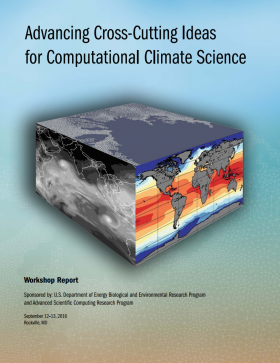Advancing Cross-Cutting Ideas for Computational Climate Science
This report presents results from the DOE-sponsored workshop entitled “Advancing X-Cutting Ideas for Computational Climate Science Workshop,” known as AXICCS, held on September 12–13, 2016 in Rockville, MD. The workshop brought together experts in climate science, computational climate science, computer science, and mathematics to discuss interesting but unsolved science questions regarding climate modeling and simulation, promote collaboration among the diverse scientists in attendance, and brainstorm about possible tools and capabilities that could be developed to help address identified computational climate challenges.
Several research opportunities emerged from discussions at the workshop that participants believed could significantly advance climate science. These include (1) process-resolving models to provide insight into important processes and features of interest and inform the development of more advanced physical parameterizations, (2) a community effort to develop and provide integrated model credibility, (3) incorporating, organizing, and managing increasingly connected model components that improve model fidelity and potentially complexity, and (4) treating Earth system models as one interconnected organism without numerical- or data-based boundaries that limit interactions.
Participants also identified several cross-cutting advances in mathematics, computer science, and computational science that would be needed to enable one or more of these big ideas. It is critical to address the need for organized, verified, and optimized software, which enables the models to grow and continue to provide solutions in which the community can have confidence. Effectively utilizing the newest computer hardware enables simulation efficiency and the ability to handle output from increasingly complex and detailed models. This will be accomplished through hierarchical multiscale algorithms in tandem with new strategies for data handling, analysis, and storage.
These big ideas and cross-cutting technologies for enabling breakthrough climate simulation advancements also need the “glue” of outreach and learning across relevant scientific domains to be successful. The workshop identified several strategies to allow productive, continuous engagement with those who have a broad knowledge of the various parts of the problem. Specific ideas to foster education and tools to make material progress were discussed. Examples include follow-on cross-cutting meetings that enable unstructured discussions of the types this workshop fostered. A concerted effort to recruit undergraduate and graduate students from all relevant domains and provide them experience, training, and networking across their immediate expertise is needed. This will broaden and expand their exposure to the future needs and solutions and provide a pipeline of scientists with a diversity of knowledge and know-how. Providing real-world experience with subject matter experts from multiple angles may also motivate the students to attack these problems and even come up with the missing solutions.

